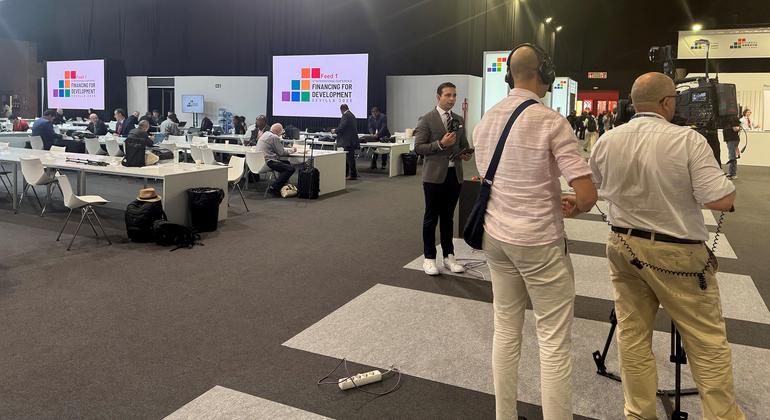A bold new initiative aimed at giving debt-distressed countries a unified platform in the global financial landscape has officially launched at the United Nations’ sustainable development summit in Sevilla.
The Borrowers’ Forum, introduced during the high-level conference, is being championed as a landmark step toward overhauling the current international debt architecture. Backed by the UN and emerging as a central pillar of the Sevilla Agreement, the Forum seeks to level the playing field for developing nations often sidelined in creditor-dominated negotiations.
“This is not just talk – this is execution,” declared Dr. Rania Al-Mashat, Egypt’s Minister of Planning and Economic Development. “The Borrowers’ Forum is a real plan, driven by countries, to create a shared voice and strategy in confronting debt challenges.”
The platform is one of 11 major proposals by the UN Secretary-General’s Expert Group on Debt and aims to facilitate experience-sharing, technical and legal support, and collective bargaining strength. According to Rebeca Grynspan, Secretary-General of the UN Trade and Development (UNCTAD), the initiative addresses a long-standing power imbalance in debt negotiations.
“Voice is not just the ability to speak — it’s the power to shape outcomes,” she emphasized. “Today, 3.4 billion people live in countries that pay more in debt service than they do on health or education.”

A Step Toward Equal Negotiating Power
Zambia’s Foreign Minister, Mulambo Haimbe, welcomed the launch, describing it as a catalyst for “long-term partnerships, mutual respect, and shared responsibility,” and offered his country as a potential host for early discussions.
Spain’s Finance Minister, Carlos Cuerpo, underscored the urgency, referring to the global debt burden as “silent but urgent” and called the Forum a “Sevilla moment” equivalent to the founding of the Paris Club of creditors in the 1950s.
UN Special Envoy on financing for the 2030 Agenda, Mahmoud Mohieldin, framed the Borrowers’ Forum as a critical tool for systemic change. “This is about voice, about fairness – and about preventing the next debt crisis before it begins,” he stated.
The forum’s unveiling comes against the backdrop of mounting debt challenges across the developing world. The Sevilla Agreement, formally known as the Compromiso de Sevilla, was adopted by consensus and contains a suite of commitments centered on sovereign debt reform.
These include backing borrower-led solutions, boosting debt transparency, fostering better coordination among lenders, and exploring a multilateral legal framework for sovereign debt restructuring. The agreement also supports country-driven debt sustainability strategies, the inclusion of debt payment suspension clauses for climate-vulnerable countries, and stronger safeguards in debt-for-climate and debt-for-nature swaps.
However, the Sevilla Agreement has not escaped criticism. Civil society leaders expressed disappointment, arguing that the document lacks the ambition needed to address the deep-rooted inequities in the current global debt system.
Speaking at a media briefing, Jason Braganza from the African Forum and Network on Debt and Development (AFRODAD) voiced his disapproval: “This document did not start with much ambition and still managed to be watered down,” he remarked.
“Nearly half of African countries are facing a debt crisis. Instead of investing in health, education, and clean water, they’re paying creditors.”
Braganza commended the efforts of the African Group and the Alliance of Small Island States for advocating a UN Framework Convention on sovereign debt. While that goal remains unrealized, he acknowledged that a new intergovernmental process included in the agreement could provide a path forward.
Meanwhile, Tove Ryding from the European Network on Debt and Development (Eurodad) warned that debt-for-climate swaps were “false solutions” and fail to offer genuine fiscal relief.
“We are told there’s no money to fight poverty or climate change — but there is. The problem is economic injustice. And the outcome of this conference reflects business as usual.”
She praised the recent progress toward a new UN Tax Convention as evidence that change is possible, quipping: “If only we had a tax dollar for every time we were told this day would never come.”
As such, the Borrowers’ Forum represents a critical step toward empowering debtor nations, ensuring fairer negotiations, and reshaping a global debt system long skewed in favor of powerful creditor interests.



















